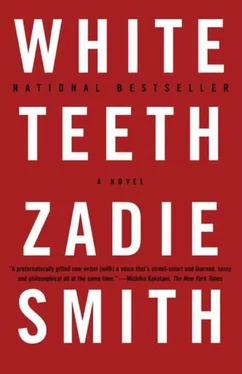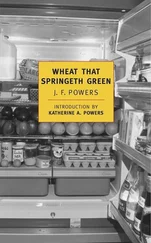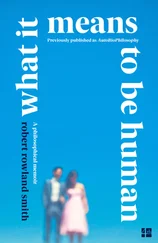What lengths won’t he travel, how many hits of the gavel
By Allah, how thankful he is ( yes, madam, one moment, madam ), how gladdened by the thought that Magid, Magid at least, will, in a matter of four hours, be flying east from this place and its demands, its constant cravings, this place where there exists neither patience nor pity, where the people want what they want now , right now ( We’ve been waiting twenty minutes for the vegetables ), expecting their lovers, their children, their friends and even their gods to arrive at little cost and in little time, just as table ten expect their tandoori prawns…
At the auction of her choosing, how many Rembrandts, Klimts, De Koonings?
These people who would exchange all faith for sex and all sex for power, who would exchange fear of God for self-pride, knowledge for irony, a covered, respectful head for a long, strident shock of orange hair-
It is Poppy at table twelve. It is Poppy Burt-Jones. And just the name would be enough right now (for he is at his most volatile, Samad; he is about to split his own sons in two like that first nervous surgeon wielding his clumsy spit-wet knife over the clodded skin of the twins of Siam), just the name would be enough to explode his mind. The name alone is a torpedo heading for a tiny fishing boat, blowing his thoughts out of the water. But it is more than the name, the echo of a name spoken by some thoughtless fool or found at the bottom of an old letter, it is Poppy Burt-Jones herself in the freckled flesh. Sitting cold and determined with her sister, who seems, like all siblings of those we have desired, an uglier, mis-featured version.
‘Say something, then,’ says Poppy abruptly, fiddling with a Marlboro packet. ‘No witty rejoinder? No crap about camels or coconuts? Nothing to say?’
Samad doesn’t have anything to say. He merely stops humming his tune, inclines his head at exactly the correct deferential angle, and puts the nib of his pen preparedly to paper. It is like a dream.
‘All right, then,’ Poppy is saying tartly, looking Samad up and down, lighting up a fag. ‘Have it your way. Right. To start with we’ll have lamb samosas and the yoghurt whatdyamacallit.’
‘And for the main,’ the shorter, plainer, oranger, snub-nosed sister is saying, ‘Two Lamb Dawn Sock and rice, with chips, please , waiter.’
At least Archie is right on time; right year, right date, right hour; 1984, 5 November, 1 a.m. Outside the restaurant, dressed in a long trench-coat, standing in front of his Vauxhall, one hand tickling some spanking new Pirelli tyres, the other pulling hard on a fag like Bogart or a chauffeur or Bogart’s chauffeur. Samad arrives, clasps Archie’s right hand in his own and feels the coldness of his friend’s fingers, feels the great debt he owes him. Involuntarily, he blows a cloud of frozen breath into his face. ‘I won’t forget this, Archibald,’ he is saying, ‘I won’t forget what you do for me tonight, my friend.’
Archie shuffles about awkwardly. ‘Sam, before you – there’s something I have to-’
But Samad is already reaching for the door, and Archie’s explanation must follow the sight of three shivering children in the back seat like a limp punchline.
‘They woke up , Sam. They were all sleeping in the same room – a sleepover, like. Nothing I could do. I just put coats over their pyjamas – I couldn’t risk Clara hearing – I had to bring them.’
Irie asleep; curled up with her head on the ashtray and her feet resting on the gearbox, but Millat and Magid reaching out for their father gleefully, pulling at his flares, chucking him on the chin.
‘Hey, Abba! Where we going, Abba? To a secret disco party? Are we really?’
Samad looks severely at Archie; Archie shrugs.
‘We’re going on a trip to an airport. To Heathrow.’
‘Wow!’
‘And then when we get there, Magid – Magid-’
It is like a dream. Samad feels the tears before he can stop them; he reaches out to his eldest-son-by-two-minutes and holds him so tight to his chest that he snaps the arm of his glasses. ‘And then Magid is going on a trip with auntie Zinat.’
‘Will he come back?’ It is Millat. ‘It would be cool if he didn’t come back!’
Magid prises himself from his father’s headlock. ‘Is it far? Will I be back in time for Monday – only I’ve got to see how my photosynthesis is for science – I took two plants: put one in the cupboard and one in the sunlight – and I’ve got to see , Abba, I’ve got to see which one -’
Years from now, even hours after that plane leaves, this will be history that Samad tries not to remember. That his memory makes no effort to retain. A sudden stone submerged. False teeth floating silently to the bottom of a glass.
‘Will I get back for school, Abba?’
‘Come on,’ says Archie, solemnly from the front seat. ‘We’ve got to get cracking if we’re going to make it.’
‘You’ll be in a school on Monday, Magid. I promise. Now sit back in your seats, go on. For Abba, please.’
Samad closes the car door and crouches to watch his twin sons blow their hot breath on to the window. He puts his one hand up, applying a false touch to their lips, raw pink against the glass, their saliva mingling in the grimy condensation.
To Alsana’s mind the real difference between people was not colour. Nor did it lie in gender, faith, their relative ability to dance to a syncopated rhythm or open their fists to reveal a handful of gold coins. The real difference was far more fundamental. It was in the earth. It was in the sky. You could divide the whole of humanity into two distinct camps, as far as she was concerned, simply by asking them to complete a very simple questionnaire, of the kind you find in Woman’s Own on a Tuesday:
(a) Are the skies you sleep under likely to open up for weeks on end?
(b) Is the ground you walk on likely to tremble and split?
(c) Is there a chance (and please tick the box, no matter how small that chance seems) that the ominous mountain casting a midday shadow over your home might one day erupt with no rhyme or reason?
Because if the answer is yes to one or all of these questions, then the life you lead is a midnight thing, always a hair’s breadth from the witching hour; it is volatile, it is threadbare; it is carefree in the true sense of that term; it is light, losable like a keyring or a hairclip. And it is lethargy: why not sit all morning, all day, all year, under the same cypress tree drawing the figure of eight in the dust? More than that, it is disaster, it is chaos : why not overthrow a government on a whim, why not blind the man you hated, why not go mad, go gibbering through the town like a loon, waving your hands, tearing your hair? There’s nothing to stop you – or rather anything could stop you, any hour, any minute. That feeling. That’s the real difference in a life. People who live on solid ground, underneath safe skies, know nothing of this; they are like the English POWs in Dresden who continued to pour tea and dress for dinner, even as the alarms went off, even as the city became a towering ball of fire. Born of a green and pleasant land, a temperate land, the English have a basic inability to conceive of disaster, even when it is man-made.
It is different for the people of Bangladesh, formerly East Pakistan, formerly India, formerly Bengal. They live under the invisible finger of random disaster, of flood and cyclone, hurricane and mud-slide. Half the time half their country lies under water; generations wiped out as regularly as clockwork; individual life expectancy an optimistic fifty-two, and they are coolly aware that when you talk about apocalypse, when you talk about random death en masse, well, they are leading the way in that particular field, they will be the first to go, the first to slip Atlantis-like down to the seabed when the pesky polar ice-caps begin to shift and melt. It is the most ridiculous country in the world, Bangladesh. It is God’s idea of a really good wheeze , his stab at black comedy. You don’t need to give out questionnaires to Bengalis. The facts of disaster are the facts of their lives. Between Alsana’s sweet sixteenth birthday (1971), for example, and the year she stopped speaking directly to her husband (1985), more people died in Bangladesh, more people perished in the winds and the rain, than in Hiroshima, Nagasaki and Dresden put together . A million people lost lives that they had learnt to hold lightly in the first place.
Читать дальше












